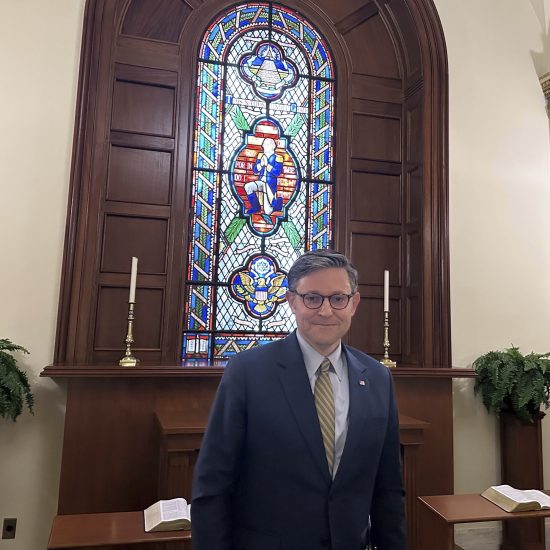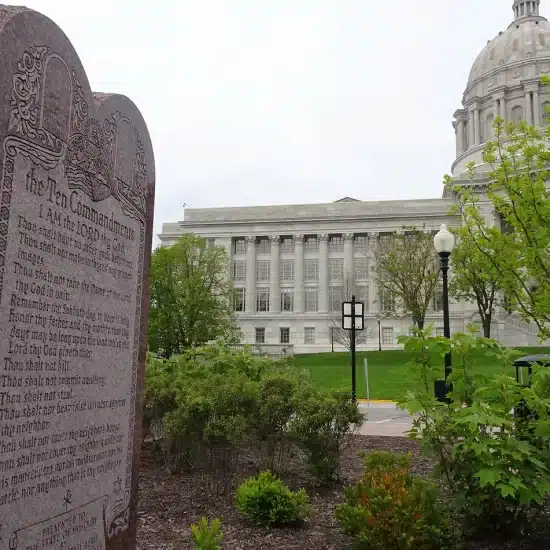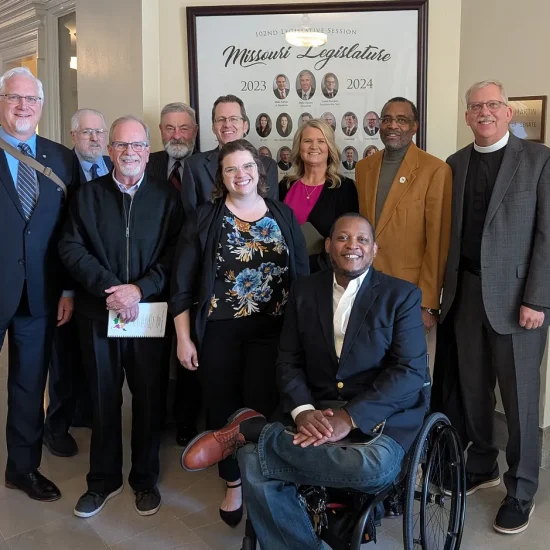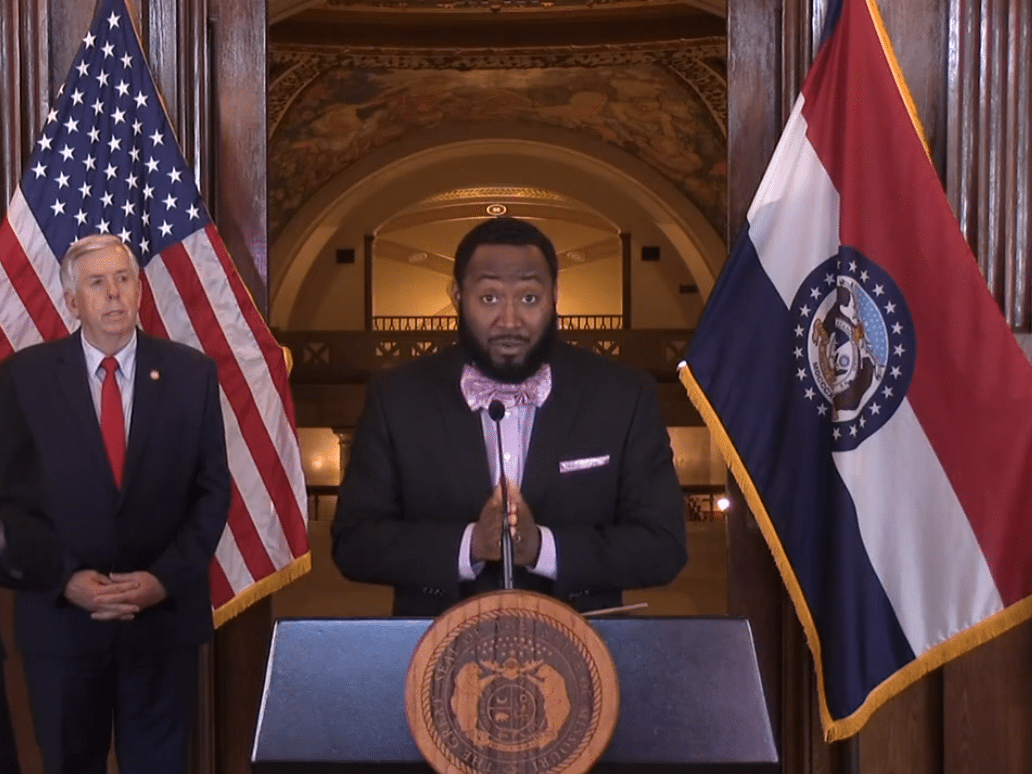
After weeks of saying Missouri would reopen today (May 4) from coronavirus shutdown orders, Governor Mike Parson on Friday declared a statewide “Day of Prayer” to occur two days later on the eve of the reopening. His announcement for Sunday prayer added to questions he has given unconstitutional preferential treatment to Christianity during official government briefings on coronavirus.
As of May 4, more than 3.6 million people globally have been infected with the COVID-19 respiratory disease caused by coronavirus, and more than 250,000 have died. In the U.S., the country with the highest number of infected persons and deaths, more than 1.2 million have tested positive and more than 69,000 have died.
Prior to his announcement of a statewide day of prayer, Parson, a member at First Baptist Church in Bolivar, brought Christian prayers into official briefings, which are held in the state Capitol to update the public about the coronavirus pandemic. On Good Friday (April 10), Parson invited two Christian minsters to the briefing podium to each offer a devotional and to pray. However, he didn’t similarly invite a rabbi during Passover (April 8-16) or an imam so far during Ramadan (April 23-May 23).
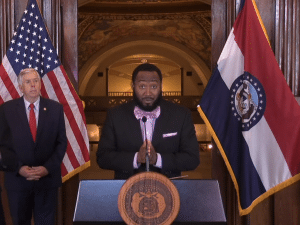
Screengrab of Jon Nelson offering a devotional during Gov. Parson’s April 10 coronavirus briefing.
The first pastor to speak was Jon Nelson, lead pastor at Soma Community Church in Jefferson City. Nelson also serves as first vice president of the Missouri Baptist Convention. The second minister was Robert Kurwicki of St. Michael’s Church in Russellville. Kurwicki also serves as chaplain for the Missouri House of Representatives.
On April 24, Word&Way presented a question about this unequal religious treatment during Parson’s daily briefing. Noting the role of the two Christian pastors and the lack of rabbis or imams during their holy days, Word&Way asked, “Are you concerned your preferential treatment during these briefings suggests an official endorsement of one religion?”
“Most certainly I do not, nor was that ever the intention of why they were in here that day” Parson answered. “They were basically here just to show that faith plays a big part of who we are in the state of Missouri, no matter what religious denomination you’re associated with.”
“I wanted to make sure that people understood how important faith is in all venues in the state of Missouri,” he added. “I think it’s important for the state of Missouri that we make sure and maintain that faith base in this state, and everybody has the opportunity.”
Parson said the two pastors were included merely because of “a matter of timing, they were here.” However, he had announced nearly four hours before the April 10 briefing that the pastors would participate. And an MBC leader noted on social media even hours earlier that Parson had asked Nelson to talk about faith at the briefing later that day. Parson didn’t mention if other clergy besides those from the two largest faith groups in the state were invited to participate.
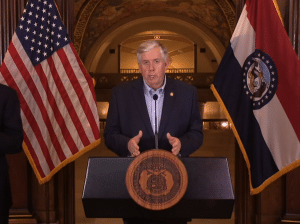
Screengrab of Governor Mike Parson answering a question from Word&Way during his April 24 coronavirus briefing.
Talking more about his faith-based outreach, Parson said he’s on a weekly conference call about the coronavirus response with pastors in the state. He did not clarify if those participants are just Christian clergy, but the call Word&Way participated in did not include questions from any non-Christian clergy.
Parson added that before coronavirus hit, he held a monthly meeting with religious leaders “from different denominations and different beliefs.” He didn’t mention if those meetings include non-Christian clergy, but the MBC leader who coordinates them has described the events as for pastors.
Although Parson said in his answer to Word&Way that the point of inviting pastors was to show the importance of faith broadly for all of Missouri, during his introduction of the two ministers on April 10 he instead framed the time as a response “as we approach Easter Sunday.”
“For Christians in Missouri, we know that this is holy week and today is Good Friday,” he added during the week that also saw the start of the Jewish holiday of Passover.
Parson noted in his remarks that all religious leaders faced ministry challenges during COVID-19, “whether Christian, Jewish, Muslim, or any of the diverse faiths that many Missourians hold.” Both Nelson and Kurwicki followed Parson with explicitly Christian thoughts about how people should respond during the coronavirus crisis. In all, the religious time took up about one-third of the April 10 government briefing.
During the prayers by the ministers on April 10 and Parson’s answer on April 24, social media comments on the official video feed offered both praise for the Christian focus as well as criticism of the preferential religious treatment. Missouri Faith Voices, a faith-based advocacy organization, tweeted thanks for Word&Way’s question. MFV added that “as a multiracial multi-faith organization we are very concerned about implicit and explicit exclusion of Missouri residents.” Other social media commentators criticized the question and praised Parson’s focus on the Christian faith.
Parson’s announcement on May 1 for a day of prayer on May 3 didn’t explicitly note one faith tradition, though not all Missourians pray. It did, however, feature a call for prayer on a Sunday but not the holy days of Jews or Muslims.
Other governors have also issued calls for prayer — often with an explicit Christian tone — during the coronavirus pandemic, including in Iowa, Louisiana, Maryland, South Carolina, South Dakota, and Utah. Governors in Alaska, Georgia, Mississippi, and Oklahoma even led prayer events.
In multiple states the prayer efforts sparked controversy as critics called the Christian focus unconstitutional. For instance, the Interfaith Alliance of Iowa called Governor Kim Reynolds’s declaration “a violation of our First Amendment” as her proclamation called Jesus “Savior of the world,” and the Jewish Federation of Greater Oklahoma City criticized Governor Kevin Stitt after he participated in a Christian prayer event they said “excluded many Oklahomans.”



